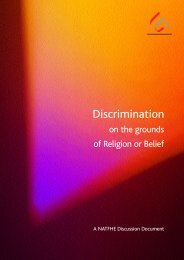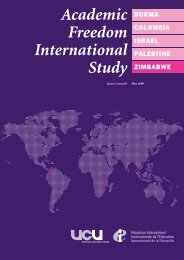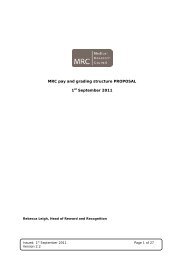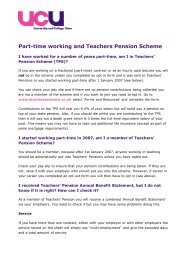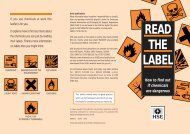a survey of stress and well-being among staff in higher ... - UCU
a survey of stress and well-being among staff in higher ... - UCU
a survey of stress and well-being among staff in higher ... - UCU
You also want an ePaper? Increase the reach of your titles
YUMPU automatically turns print PDFs into web optimized ePapers that Google loves.
F<strong>in</strong>d<strong>in</strong>gs4: Work-life balance <strong>and</strong> <strong>stress</strong>Evidence has been provided that work-life balance <strong>among</strong>st <strong>UCU</strong> members <strong>in</strong><strong>higher</strong> education cont<strong>in</strong>ues to be poor. F<strong>in</strong>d<strong>in</strong>gs <strong>in</strong>dicate that they frequentlyneglect their personal life <strong>and</strong> miss out on important activities due to thedem<strong>and</strong>s <strong>of</strong> their work. Respondents from <strong>higher</strong> education also come homefrom work too tired to do the th<strong>in</strong>gs they would like to do on a regular basis.Participants who reported more work-life conflict also tended to report lowerlevels <strong>of</strong> <strong>well</strong>-<strong>be<strong>in</strong>g</strong> <strong>in</strong> relation to dem<strong>and</strong>s, control, support from colleagues<strong>and</strong> managers, role clarity, relationships at work <strong>and</strong> management <strong>of</strong> change,<strong>and</strong> perceive <strong>higher</strong> levels <strong>of</strong> work-related <strong>stress</strong>. Of the HSE <strong>stress</strong>or dimensions,dem<strong>and</strong>s - <strong>and</strong> to a lesser extent - control <strong>and</strong> role clarity, were the mostpowerful predictors <strong>of</strong> work-life conflict.Work-life conflict questions (1=‘not at all’, 5=‘almost always’)I have to miss important personal activitiesdue to the amount <strong>of</strong> time I spend work<strong>in</strong>gMy personal life suffers because <strong>of</strong> my workI <strong>of</strong>ten neglect my personal needs because<strong>of</strong> the dem<strong>and</strong>s <strong>of</strong> my workMy job makes it difficult to ma<strong>in</strong>ta<strong>in</strong> thek<strong>in</strong>d <strong>of</strong> personal life I would likeI come home from work too tired to do theth<strong>in</strong>gs I would like to do3.23.53.63.63.8For <strong>UCU</strong> members from <strong>higher</strong> education, considerable variation was found <strong>in</strong>current levels <strong>of</strong> work-life <strong>in</strong>tegration (see figure below). For 18% <strong>of</strong> the sample,‘work’ <strong>and</strong> ‘home’ were ma<strong>in</strong>ly segmented (scor<strong>in</strong>g 1 to 3 on a 9 po<strong>in</strong>t scale). Ahigh proportion <strong>of</strong> participants, however, reported a high degree <strong>of</strong> <strong>in</strong>tegrationbetween their work <strong>and</strong> home lives (with 64% scor<strong>in</strong>g 6 or above).Current levels <strong>of</strong> work-life <strong>in</strong>tegration (%)25.518.62.85.79.37.210.9 10.77.51 2 3 4 5 6 7 8 9Total separationTotal <strong>in</strong>tegration30


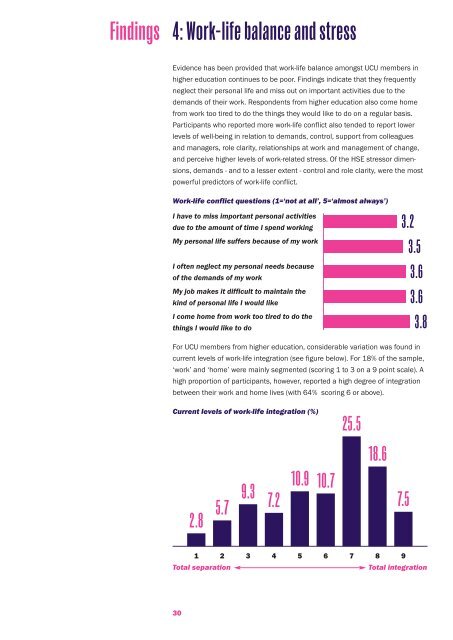

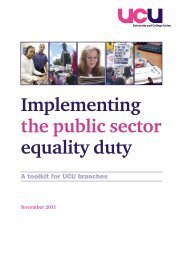

![(.pdf) [29kb] - UCU](https://img.yumpu.com/50914942/1/184x260/pdf-29kb-ucu.jpg?quality=85)

